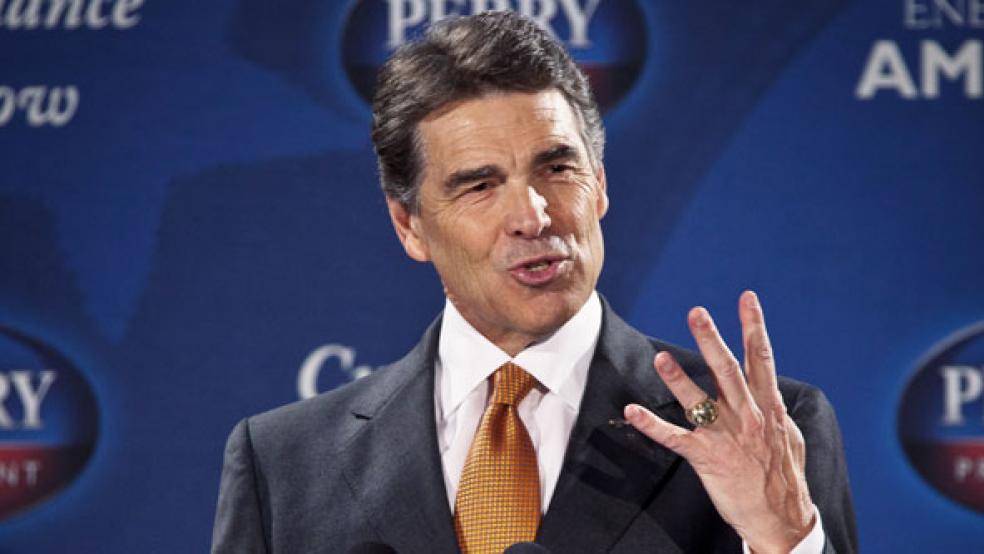Now there are sixteen, for which we give hearty thanks to former Texas Governor Rick Perry. Let us hope Mr. Perry’s resignation from the GOP primary race inspires others to follow suit.
Next Wednesday, contenders for the Republican nomination will again gather to joust on two separate debate stages, each hoping to break through and win some points, like saplings competing for sunlight. The Republican field, rich in talent and accomplishment, is struggling to be heard, overshadowed by the outsized personality and celebrity of Donald Trump.
The serious candidates – those who have solid backing and a hope of winning – are dwarfed by having to squeeze onto an overpopulated stage and wave their arms for attention, literally and figuratively. They need a chance to make their case to voters, to talk about policy, explain their vision. Not just during the debates, but on the airwaves. Under current circumstances, with The Donald sucking up more than his share of the limelight that is almost impossible.
Related: GOP Presidential Campaign Turning Into a Two-Man Race
Here’s what Republicans across the country should demand: by the time of the next debate, scheduled for October 28 in Colorado, there is but one debate stage, and fewer contestants. It is time for the most marginal candidates to bow out.
George Pataki, for instance, should withdraw from the field. The former New York Governor, who last held public office a decade ago, has been out of the game for too long, and has failed to get traction. Even his friends privately concede that his run aims to beef up his visibility and his law practice, as opposed to win the nomination. Shortly after he launched his bid in May Pataki rallied some support in New York State, polling at 11 percent along with Marco Rubio, but he has been invisible nationally. The latest Real Clear Politics polls of 15 GOP candidates don’t even include Pataki. The most recent Quinnipiac poll has him under one percent.
Also vanished from the polls is Jim Gilmore. The former Virginia Governor launched his run via video in July, but has yet to hold a campaign event or boost his presence via social media. His standing is so nonexistent that he will not be invited to participate in next week’s second-tier debate.
Those two are easy to dismiss. Others who should withdraw will likely take more convincing. On the basis of today’s polling, Lindsay Graham is facing ultra-long odds. (A prominent London bookmaker places his chance of winning the nomination at 66 to 1, only slightly worse than John McCain, who isn’t running). A recent survey of GOP primary voters in his home state of South Carolina showed that 78 percent think Graham should drop out of the race – and that’s his power base.
Related: Bush’s Tax Plan Would Boost the Economy, But Drive Up Debt
Worse for him, his candidacy appears to have soured voters on his performance in the Senate. A recent poll shows only 36 percent of voters in his state give him high marks, compared to 51 percent who disapprove. Last February, the same poll showed Mr. Graham with 54 percent of respondents scoring his performance well compared to 29 percent who gave him thumbs down.
It isn’t only about the polling. It’s still a long time until February, when voters in Iowa and New Hampshire, Nevada and South Carolina will pick their favorites. Famously, at this point in the 2012 race, Rick Perry led the field with 32 percent of the vote. A month later Newt Gingrich was out in front, with 35 percent, followed by an unlikely surge by Rick Santorum.
Polls can turn around; they are volatile. However, a candidate needs a distinctive message, substantial funding and a solid base of supporters to carry them through this exhaustive process. Graham has none of those things. His message is bleak, focusing mainly on sending troops into battle in Syria and reforming (cutting) Social Security and Medicare – not exactly the stuff of dreams. Advice to Graham: get out while you can with your dignity intact.
Related: After the Fiorina Fiasco, What Insult Will Trump Fling Next?
Others who appear to face long odds include Louisiana Governor Bobby Jindal, currently polling below 1 percent, and Rick Santorum, who is buried in the polls and running low on funds. Those same issues bedeviled Rick Perry, who just recently pulled out of the race. Despite having raised significant funds through his Super Pac, Perry’s campaign had money trouble; his staff hadn’t been paid in weeks and his organization had just shut down their South Carolina office. Also, he lacked a clear message.
Perry’s authoritative view of border security had been blown away by The Donald, who has run roughshod over the immigration issue. Rand Paul is a candidate who will forever eke out a particular slice of the electorate -- people alarmed by government snooping and military interventions -- but he is not going to be the candidate. Political neophyte Carly Fiorina is unlikely to be the standard-bearer either, though she is smart and powerful on the stump.
Some of these folks are prepping for the next round, or trying to build a career, or putting themselves forward as a VP candidate (Fiorina.) At the end, there are only a few with the potential to go the distance, and we could be surprised. But, for the good of the party, and the country, some of the hangers-on need to leave the field.





